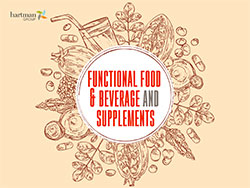
Living up to their energized disruption of established dairy and protein categories that built great momentum in 2019, plant-based foods, beverages and restaurant menu options are thriving, buoyed up by the consumer trends that pushed them forward prior to the pandemic, not the least of which was a search for culinary variety, experimentation with flexitarian eating styles and beliefs centered on plant-based products being a more sustainable protein option. Even within the pandemic, investors have also shown great enthusiasm for all things plant-based: Fast Company notes in a recent article, "In the first half of the year, U.S. alternative meat, egg, and dairy companies raised 14% more—more than $850 million—than they had raised in the entirety of 2019, which was also a record-breaking year, according to the Good Food Institute, an organization that tracks the industry."
Consumer demand for plant-based options has also been boosted by pandemic-driven events and headlines, including animal protein shortages in food retail and perhaps the most emotionally charged topic of all, the health and safety of employees working in America's meat and poultry packing plants. All of these variables may sound familiar as demand drivers for plant-based products, and certainly health, sustainability and the quest for culinary variety have been consistent primary drivers. Our recent Food & Technology: From Plant-based to Lab-grown 2019 report found that food culture is becoming increasingly focused on incorporating culinary diversity and that many consumers are trying ways of eating that move beyond the standard icons of the American diet (e.g., animal protein, starch and a vegetable). This is driving them to seek out new ways to eat, including looking beyond traditional meat and dairy categories with a more flexitarian eating approach (as opposed to strictly vegan).
From another and more nuanced perspective, consumer curiosity about plant-based ingredients lies in their intrinsic belief in the connection between plants and health, a connection as old as humanity itself, since (until recently) most of our medicines came directly from plants. These beliefs extend back into ancient history, including evidence that Neanderthals used medicinal plants to alleviate pain, ease fevers and heal wounds.
Picking up from where our Food & Technology report left off, our newest report, Functional Food & Beverage and Supplements 2020, finds that cultural influencers, scientific research and recent health crises (notably COVID-19) have highlighted the interrelated challenges we now face regarding food, health and the environment. Cultural shifts have cleared the way for a rapidly developing conversation on the central role of diet in our health and the complex challenges we face in accessing and securing the benefits of "whole foods." Functional Food 2020 observes a growing awareness of folkloric and indigenous cultures that have long understood relationships between food, health and our natural environment (and an interrelation among these realms with plant-based products and ingredients). Much of this awareness is superficial. Nevertheless, it fuels notions that plants can heal and that food is far more than a collection of calories. Consequently, consumers are also discussing and experiencing fundamental challenges to personal and community wellness—e.g., depletion of soil health, climate change, social injustice and the 2020 global coronavirus pandemic.
Relating to changes wrought by the pandemic, Functional Food 2020 finds that consumers are taking control of their own health through various immunity-supporting behaviors—reducing contact with others, increasing healthy habits to protect themselves from pathogens and consuming functional food and beverage products to increase their personal health resiliency. Use of food, drinks and supplements to support immunity due to COVID-19 concerns is accelerating existing growth trends in products that support resiliency and immunity, among which are plant-based products and ingredients. As examples, when it comes to what benefits or fortifications consumers say they seek when consuming what they view as "functional foods," 19% of functional food users say they are looking for "plant-based proteins" (such as those derived from peas or rice), and, similarly, when asked what benefits or fortifications they seek from functional beverages, 13% of functional beverage users say they are looking for plant-based proteins.
Going forward, with increased attention on health, wellness, immunity and resiliency in light of the urgent health concerns around COVID-19, plant-based consumption certainly has the potential to gain yet further traction among consumers. However, as consumers increasingly adopt a food-as-medicine approach, they are likely to become more adamant in demanding clean labels and simple, whole ingredients in plant-based meat alternatives. We already see engaged consumers questioning the ingredient lists of highly processed plant-based foods and expect this type of critique to become more widespread if brands do not adequately address such concerns.
About the Functional Food & Beverage and Supplements 2020 Report

Functionality is moving far beyond its conventional territory of vitamins and other supplements to play a key role in food and beverage in the U.S., while the supplement market evolves toward contemporary definitions of quality and value. Americans’ engagement with these spaces is measurably intensifying as a result of COVID-19—a global crisis that will impact how they solve for their health and household needs for years to come. Functional Food & Beverage and Supplements 2020 explores demand-side developments in the functional solutions landscape as well as the disruptive impacts of COVID-19.
